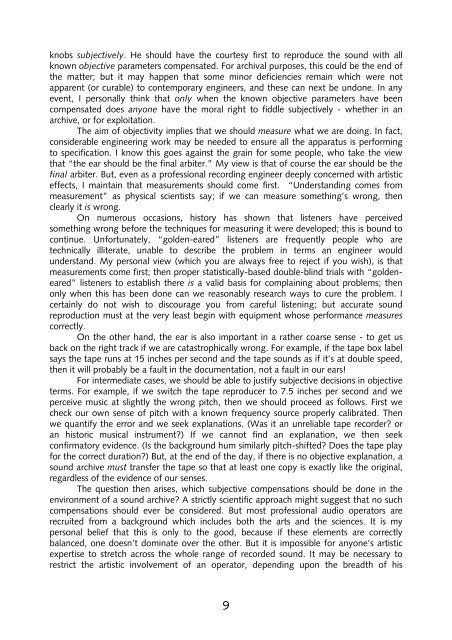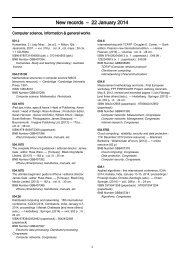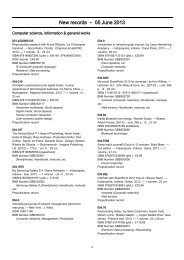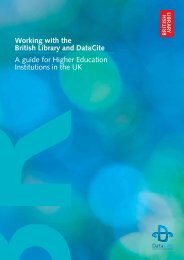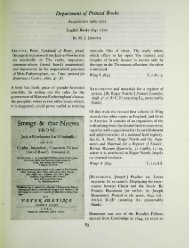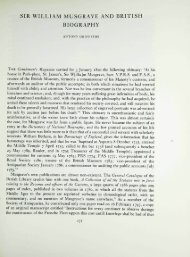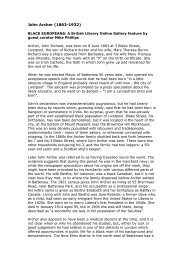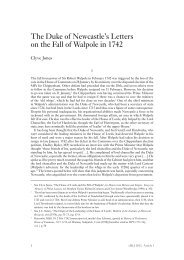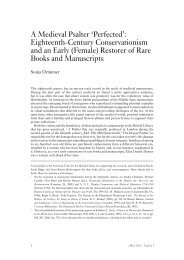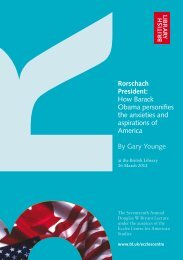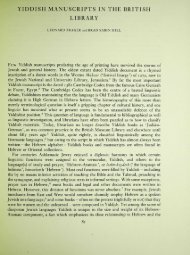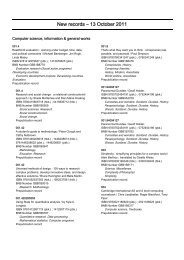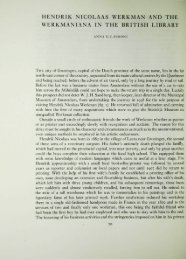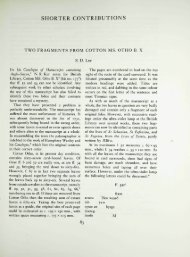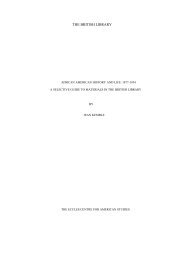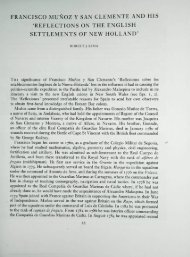MANUAL OF ANALOGUE SOUND RESTORATION ... - British Library
MANUAL OF ANALOGUE SOUND RESTORATION ... - British Library
MANUAL OF ANALOGUE SOUND RESTORATION ... - British Library
You also want an ePaper? Increase the reach of your titles
YUMPU automatically turns print PDFs into web optimized ePapers that Google loves.
knobs subjectively. He should have the courtesy first to reproduce the sound with all<br />
known objective parameters compensated. For archival purposes, this could be the end of<br />
the matter; but it may happen that some minor deficiencies remain which were not<br />
apparent (or curable) to contemporary engineers, and these can next be undone. In any<br />
event, I personally think that only when the known objective parameters have been<br />
compensated does anyone have the moral right to fiddle subjectively - whether in an<br />
archive, or for exploitation.<br />
The aim of objectivity implies that we should measure what we are doing. In fact,<br />
considerable engineering work may be needed to ensure all the apparatus is performing<br />
to specification. I know this goes against the grain for some people, who take the view<br />
that “the ear should be the final arbiter.” My view is that of course the ear should be the<br />
final arbiter. But, even as a professional recording engineer deeply concerned with artistic<br />
effects, I maintain that measurements should come first. “Understanding comes from<br />
measurement” as physical scientists say; if we can measure something’s wrong, then<br />
clearly it is wrong.<br />
On numerous occasions, history has shown that listeners have perceived<br />
something wrong before the techniques for measuring it were developed; this is bound to<br />
continue. Unfortunately, “golden-eared” listeners are frequently people who are<br />
technically illiterate, unable to describe the problem in terms an engineer would<br />
understand. My personal view (which you are always free to reject if you wish), is that<br />
measurements come first; then proper statistically-based double-blind trials with “goldeneared”<br />
listeners to establish there is a valid basis for complaining about problems; then<br />
only when this has been done can we reasonably research ways to cure the problem. I<br />
certainly do not wish to discourage you from careful listening; but accurate sound<br />
reproduction must at the very least begin with equipment whose performance measures<br />
correctly.<br />
On the other hand, the ear is also important in a rather coarse sense - to get us<br />
back on the right track if we are catastrophically wrong. For example, if the tape box label<br />
says the tape runs at 15 inches per second and the tape sounds as if it’s at double speed,<br />
then it will probably be a fault in the documentation, not a fault in our ears!<br />
For intermediate cases, we should be able to justify subjective decisions in objective<br />
terms. For example, if we switch the tape reproducer to 7.5 inches per second and we<br />
perceive music at slightly the wrong pitch, then we should proceed as follows. First we<br />
check our own sense of pitch with a known frequency source properly calibrated. Then<br />
we quantify the error and we seek explanations. (Was it an unreliable tape recorder? or<br />
an historic musical instrument?) If we cannot find an explanation, we then seek<br />
confirmatory evidence. (Is the background hum similarly pitch-shifted? Does the tape play<br />
for the correct duration?) But, at the end of the day, if there is no objective explanation, a<br />
sound archive must transfer the tape so that at least one copy is exactly like the original,<br />
regardless of the evidence of our senses.<br />
The question then arises, which subjective compensations should be done in the<br />
environment of a sound archive? A strictly scientific approach might suggest that no such<br />
compensations should ever be considered. But most professional audio operators are<br />
recruited from a background which includes both the arts and the sciences. It is my<br />
personal belief that this is only to the good, because if these elements are correctly<br />
balanced, one doesn’t dominate over the other. But it is impossible for anyone’s artistic<br />
expertise to stretch across the whole range of recorded sound. It may be necessary to<br />
restrict the artistic involvement of an operator, depending upon the breadth of his<br />
9


